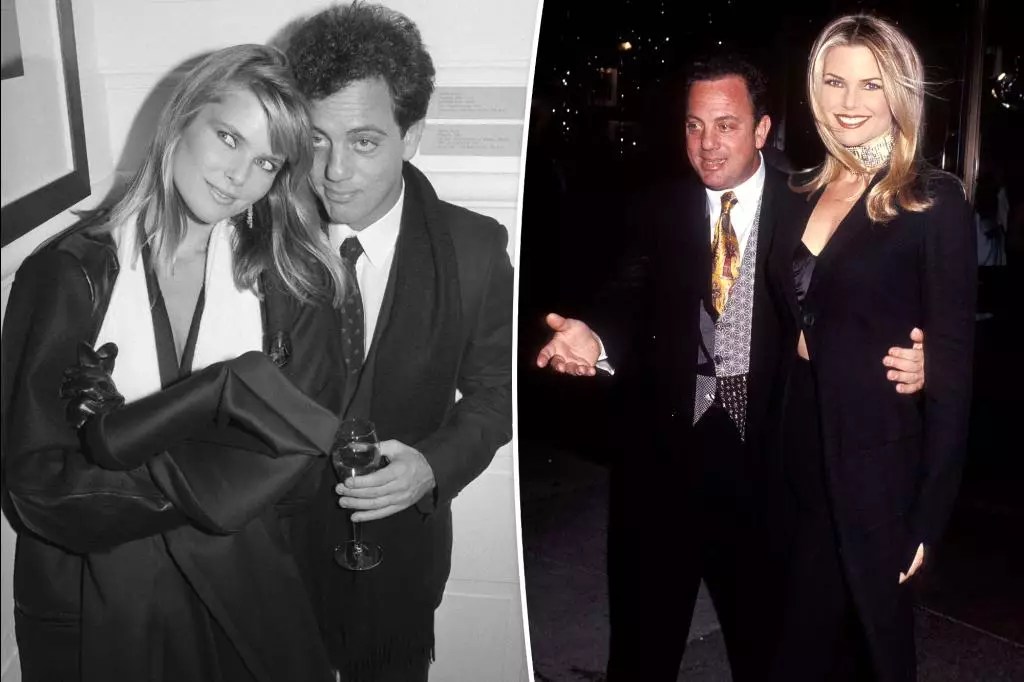In the glitzy world of fame, where the front page of a magazine can twist a narrative into something unrecognizable, true stories often lie marred under the dazzling gloss of celebrity culture. Christie Brinkley, an iconic supermodel and actress, recently opened up about the complexities of her relationship with rock star Billy Joel in her memoir, “Uptown Girl.” Through vivid anecdotes and incisive reflections, she paints a picture of love intertwined with hardship, emphasizing the challenges faced by those in the public eye dealing with addiction and its ramifications.
Brinkley recalls a particularly harrowing episode when Joel’s battle with alcoholism manifested in bizarre and troubling behavior – a poignant reminder that substance abuse can distort even the most beloved personalities. The incident, as she describes, involves Billy drunkenly consuming spaghetti directly from the pan and subsequently lashing out at his family, accusing them of snacking on his food. While it may be easy for many to laugh at the absurdity of such a scene, for Brinkley, it underscores the darker undertones of living with a partner facing the grips of addiction—an issue too often treated flippantly in popular discussions.
Silenced Struggles: The Weight of Secrecy
One poignant element of Brinkley’s revelations is her admission of silence. She confides that discussing Joel’s drinking issues, which she viewed through the lens of love, was a taboo she felt compelled to uphold. “I was 100% dedicated to Billy, but I never told anyone about our issues,” she stated, revealing the emotional toll such secrecy can impose. Society often lays a burden on individuals to maintain a façade of perfection, especially within celebrity circles, where public perception can dictate personal realities. Brinkley’s choice to carry the weight of her husband’s struggles alone reflects a larger narrative about stigma, familial loyalty, and the yearning to protect both loved ones and oneself.
As Brinkley articulates her feelings, one detects an undercurrent of fierce love entwined with deep frustration—an emotional cocktail that can confuse even the steadiest of individuals. Her consideration of Joel’s alcoholism as a disease rather than a character flaw sets her apart from a myriad of public accusations against addicts. It reveals a compassionate yet painful understanding that addiction doesn’t just affect the user; it reverberates through families, altering relationships irreparably.
Love and Fear: An Indelible Dance
The dynamic within Brinkley and Joel’s relationship morphs as she recounts her emotional oscillation between love and fear—a cycle emblematic of many relationships marred by addiction. “For the sake of our daughter,” she notes, she remained committed to their marriage for eleven tumultuous years. However, the persistent distress drove an inevitable wedge between them, leading Brinkley to assess the quality of life fostered within their union. Herein lies a crucial examination of the often-romanticized notion of “sticking it out” in relationships: the reality sometimes involves a painful realization that love alone may not be sufficient to endure.
Brinkley’s reflections serve as a poignant reminder that loving someone doesn’t always equate to preserving a partnership. This duality can create a tormenting loneliness, leaving one feeling isolated despite being enveloped in a romantic relationship that no longer functions as intended. Brinkley’s eventual decision to file for divorce in 1994 served as a testament to her strength—acknowledging the painful truth that sometimes, separation is necessary for both parties to heal.
The Power of Forgiveness and Friendship
Despite the tumultuous journey, Brinkley’s narrative does not end in bitterness. Today, she shares a “great” friendship with Joel, demonstrating remarkable forgiveness. While the depth of struggle left scars, it has seemingly led to a recognition of their intertwined paths as co-parents. The evolution of their relationship post-divorce, coupled with mutual respect, offers a refreshing counter-narrative to the stereotypes often associated with celebrity breakups. Their story showcases how resilience can blossom into an enduring bond, even after the most turbulent experiences.
Brinkley’s journey exemplifies that love can be both a shelter and a storm; it can offer comfort in one breath while exposing one to profound adversity in the next. At its core, her narrative is not only a story of love complicated by addiction but also a demonstration of human resilience and the capacity to forge connections beyond the traditional confines of romance. Her insights challenge us to rethink the narratives we often accept about celebrity lives and relationships, urging us to consider the profound emotional landscapes beneath the surface.
